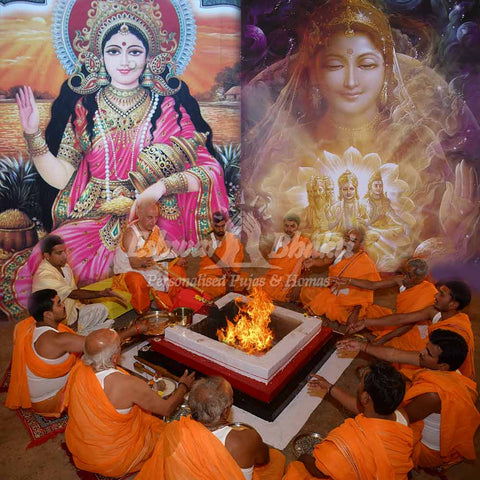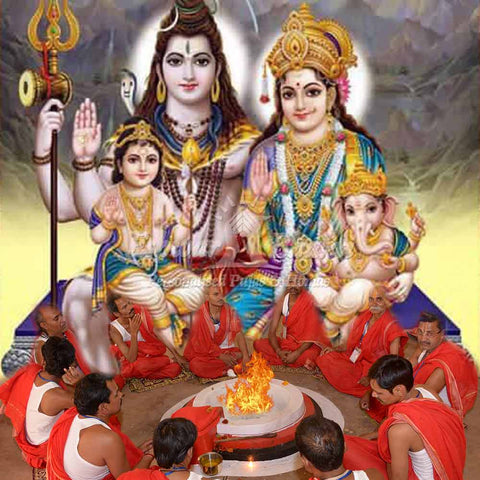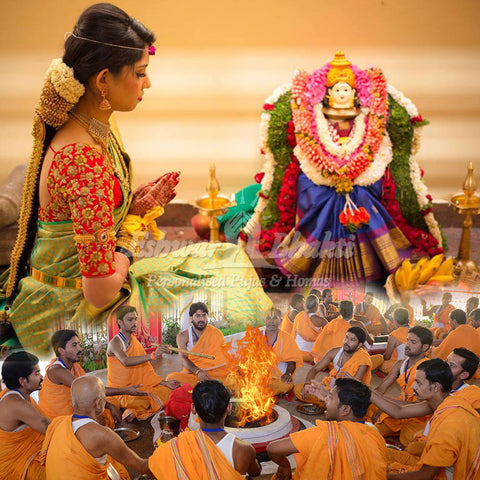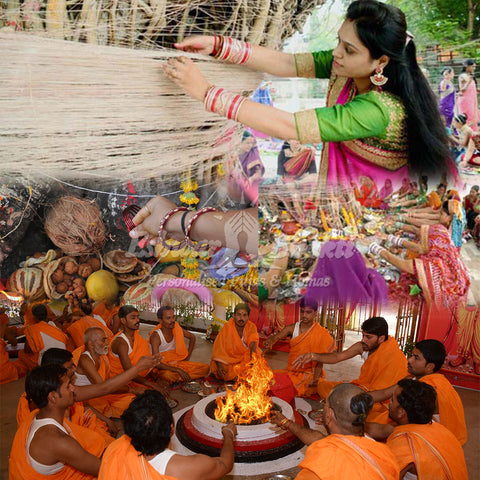Karwa Chauth
Karwa Chauth, the famous festival of India celebrated by Hindu married women, falls close to Sharad Purnima or the immediate full moon night after Vijaya Dashami. Many Hindu women around the country gear up to celebrate Karwa Chauth after Navaratri days. Married Hindu women fast all day to pray for the long lives of their husbands. This festival is unique in the sense that the day is observed with nirjala (without water) fast. Women do not even consume a morsel of food or even a drop of water until they see the moon in the evening. Fasting is usually rigorous keeping their health too in mind. This is also an occasion where the bonding in the relationship between husband and wife becomes more concrete. Colourful rangolis are also drawn at houses along with singing of melodious folk and devotional songs.

Importance of Vrat (fasting) during Karwa Chauth: 'Karwa' is pot and 'chauth' means fourth. This is the occasion of offering Arghya to the moon using the pot on Chaturthi tithi. This occasion falls on Krishna Paksha Chaturthi or the fourth day of moon's waning phase in the month of Kartik. Another name for this festival is Karak Chaturthi. This custom is believed to have originated in ancient times, when many men used to stay away from their family for several months. This may be because of trade, travel or even wars to protect the country. Wives of those who stayed away perform special prayers for the longevity of their husbands. It included fasting for a day, for their health and overall family welfare. They start preparing for the fasting, a few days in advance. Applying mehndi, getting sargi from mothers-in-law etc. are the key celebrations. Apart from these, gifts comprising bangles, saris, sindoor, nuts, dry fruits, and snacks are also offered.
Karwa Chauth – Celebration: Karwa Chauth Sargi and its time: Sargi is a very significant ritual on this occasion. Mothers-in-law prepare traditional dishes and present the thaali of Sargi to their daughters-in-law. One among the important dish is Feni, a vermicelli pudding. This dish is eaten before sunrise. Those who plan to observe full day fasting must have it after the Chaturthi Tithi (Chaturthi date) at 3:24 AM or before the sun rise. All these rituals and importance shows that this is an occasion where the bondage between mother and daughter-in-law is expressed with divinity, love and affection. Parents buy gifts and sweets for their daughters who recently got married.
Puja thali is decorated to symbolise a happily married life during this occasion. Pregnant women and those who are sick are of`ten advised to avoid fasting. Some women get dressed in new red coloured clothes symbolising a happy married life. Some women celebrate it by narrating folk tales, reading stories on the day of fasting and singing folk songs by making the celebrations lively. The fast is broken in the evening after seeing a glimpse of the moon. Shopping of new items also adds colour to this festival, and markets are also decorated.
Another common ritual is to worship Goddess Parvathi, consort of Lord Shiva. A didactic story related to Hindu gods is narrated by an elderly woman in the family before opening the fast. Stories have always been an attractive way to lay down the principles followed by Hindus.
Festivals celebrated by Hindus have always been the true expression of its rich cultural heritage drawn from ancient ages. These celebrations during the festival are a source of joy and happy memories. It creates a lifelong impression in the minds of people who observe the fast. Markets selling pots are full of colourful pooja items with decorated thalis and idols of goddess Parvati. The puja plate is decorated with new, glittering cloth piece along with gota patti. North Indian sweets like fenia, common dry fruits, matthi and kheer are beautifully arranged on this plate.
Neighbours and family members join together for the rituals performed in the evening. Idol of goddess Parvathi is worshipped. Karwa Chauth Mahatamya (significance) is narrated during this occasion. The women also chant the holy hymn by passing pooja thalis around in the circle. Women wait for the moon to rise after the pooja. During the moon rise, women begin the lighting of diyas by chanting mantras. Clay pots are filled with milk, water, coins etc. as offering. Arghya to moon is offered using Karwas (pot). They see the moon through a round shape sieve. Same sieve is used to look at their husbands and praying for his long life. Breaking of fasting happens when husband offers first sip of water and food. A great feast is followed by this.
Legends of Karwa Chauth: A widely known story is of the beautiful queen named Veervati. Veervati was the only sister among seven loving brothers. Her first Karwa Chauth was at her parents' house. She kept the fast. Knowing this, her brothers were anguished. She refused their pleading to break the fast. They played a trick by placing a mirror on a Pipal tree, that was in the shape of a moon. She believed that it was original moon. Veervati fell in the trick and broke the fast. But the fate was not with her. News reached that her husband, the king, was dead just before breaking the fast.
The story in Mahabharata: Draupadi also used to observe the Karwa Chauth fast for the safety and longevity of her husbands. The story goes like this – Pandavas had to go through lot of struggles and problems at the time of Arjuna’s absence during his penance. Draupadi prayed to Lord Krishna during this difficult situation. Krishna reminded her about a similar situation faced by Goddess Parvati and how she kept a fast for Lord Shiva. This inspired Draupadi to fast on the day of Karva Chauth for her husbands by following all the rituals. It is believed that the Pandavas were able to resolve their issues with the power of her fasting.
The story of Karva: There was a devoted wife with name Karwa. Karwa’s husband was caught by a crocodile while bathing in a river. Karwa tied the crocodile with a cotton yarn to save her husband. She asked Yamaraja, God of death to send the animal to hell. Yamaraja refused. She then threatened to destroy Yamaraja with her curse. He had to send crocodile to hell and blessed her husband for a long life.
Summary: Traditional rituals and festivals like Karwa Chauth add charm, bliss, love and affection in any couple’s relationship. Love and care have always been the foundation of any relationship. Festivals like these make this foundation even stronger.





Comments
nice article loved it but story is not a completed its just a glimpse of it. do share the full story too.